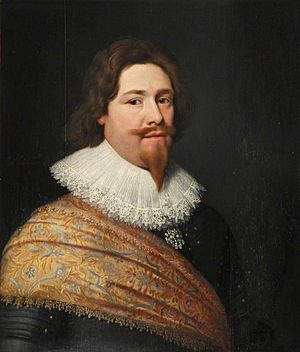John Ernest I, Duke of Saxe-Weimar facts for kids
Quick facts for kids John Ernest I |
|
|---|---|

Portrait by Michiel Jansz. van Mierevelt
|
|
| Duke of Saxe-Weimar | |
| Reign | 1605–1620 |
| Predecessor | Johann |
| Successor | Wilhelm |
| Born | 21 February 1594 Altenburg |
| Died | 6 December 1626 (aged 32) Sankt Martin, Hungary |
| House | House of Wettin |
| Father | Johann, Duke of Saxe-Weimar |
| Mother | Dorothea Maria of Anhalt |
| Religion | Lutheran |
Johann Ernst I (born February 21, 1594, died December 6, 1626) was a German noble. He was a Duke of Saxe-Weimar. He was born in Altenburg and passed away in Sankt Martin, Hungary.
Contents
Early Life and Education
Johann Ernst I was the oldest son of Johann, Duke of Saxe-Weimar and Dorothea Maria of Anhalt. When he was young, he had a special teacher and a weapons master named Matt of Johan.
His father died in 1605. After that, someone else managed the duchy until Johann Ernst was old enough. In 1608, at age 14, he started studying at the University of Jena. His younger brothers, Wilhelm and Frederick, joined him.
While at university, a supervisor named Kaspar of Teutleben and a teacher named Frederick Hortleder helped guide the three princes. From 1613 to 1614, Johann and his brothers went on a study trip. They visited countries like France, Great Britain, and the Netherlands.
Becoming Duke and Guardian
In 1615, Johann Ernst became an adult. He then took full control of his duchy. He also became the guardian for his younger brothers, who were not yet adults.
The Fruitbearing Society
On August 24, 1617, Johann Ernst created a special group. It was called The Fruitbearing Society (Fruchtbringende Gesellschaft). This was a German group focused on literature and language. He started it during his mother's funeral at Schloss Hornstein. The young duke was one of the first members of this society.
Supporting Education Reforms
During his time as duke, Johann Ernst supported new ideas for schools. He helped Wolfgang Ratke with his reforms in Köthen. He also backed similar school changes by Johannes Kromayer and Johann Weidner in Weimar. These reforms started in 1618 in Jena and Weimar. He even canceled some old tax rules to help with these changes.
Role in the Thirty Years' War
In 1620, Johann Ernst served under Frederick V, Elector Palatine. Frederick V was also known as the famous Winter King. After Frederick V lost the Battle of White Mountain on November 8, 1620, Johann Ernst refused to give up easily to the Emperor. Because of this, he lost his lands and could no longer be the guardian of his brothers.
After losing his lands, Johann Ernst strongly opposed the Habsburgs. He fought in the Netherlands and worked as a ride master. Later, he became a Danish lieutenant general of the cavalry. He fought in the Thirty Years' War in Westphalia and Lower Saxony. He helped conquer parts of Schlesien.
Finally, he went to fight for Count Ernst von Mansfeld in Hungary. Johann Ernst passed away there at the age of 32. His death in Sankt Martin was due to injuries from the war.
See also
 In Spanish: Juan Ernesto I de Sajonia-Weimar para niños
In Spanish: Juan Ernesto I de Sajonia-Weimar para niños
 | Shirley Ann Jackson |
 | Garett Morgan |
 | J. Ernest Wilkins Jr. |
 | Elijah McCoy |

